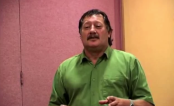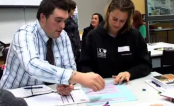Te Aho Arataki Marau mō te Ako i Te Reo Māori - Kura Auraki
Curriculum Guidelines for Teaching and Learning Te Reo Māori in English-medium Schools: Years 1-13
Curriculum guidelines 521 PDF (PDF, 4 MB)
Page navigation:
He kōrero mō te reo Māori
Te reo Māori
Te reo Māori is the ancestral language of the Māori people of Aotearoa. It derives from eastern Polynesia and is most closely linked to the Cook Islands Māori, Tahitian and Hawai‘ian languages.
Māori have a rich and complex language and culture. Māori oral literature takes many forms, including whaikōrero, karanga, waiata, haka, poi, whakataukī, and pepeha.
The visual language includes body language and gesture, dance, and drama. The visual culture is expressed in a multitude of ways, including carved and woven art works made for both personal and community use, clothing, personal ornaments, tools, weapons and architectural structures (Ministry of Education, 2004 and 2007).
The arrival of Pākehā in the late eighteenth century brought new languages and different ways of communicating. The missionaries worked with Māori to develop a written code for te reo Māori. The first document in te reo Māori was a lesson book printed in 1815, and the first major publication was a Māori version of the Bible. Over thirty newspapers were published for a primarily Māori audience between 1842 and 1933, and most of these were written solely in te reo Māori.
By the early 1860s, the Pākehā population of New Zealand outnumbered that of Māori; thus, English became the dominant language. Nevertheless, te reo Māori persisted as the first language in Māori homes and communities until the 1930s. (See page 10 for an explanation of why this subsequently changed.)
All languages evolve to meet the needs of those who speak the language, as these needs change over time.
One of the responsibilities of Te Taura Whiri i te Reo Māori (the Māori Language Commission) is to ensure that, as the world continues to change, the quality of te reo Māori is maintained and improved.
E kore au e ngaro; he kākano i ruia mai i Rangiātea.
I shall never be lost; the seed that was sown from Rangiātea.



